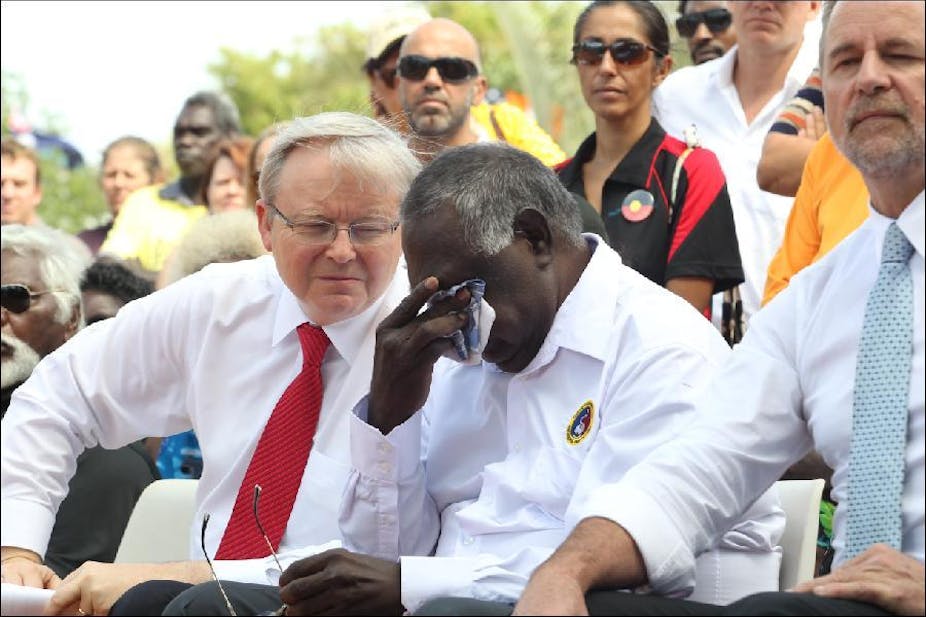Kevin Rudd has said he wants a referendum within two years of the election to recognise Australia’s Indigenous people in the constitution - and told Tony Abbott to get his act together on the issue.
Both leaders expressed support for constitutional recognition, which would require bipartisanship to carry a referendum, but immediately fell into a squabble over it.
Rudd, speaking at the 50th anniversary of the Yirrkala bark petitions for land rights, said constitutional change had to be “a part of a journey that makes all Australians proud”.
“I therefore as Prime Minister want to see this matter brought to the people of Australia by referendum within two years of the election of the next parliament,” he said.
Saying a parliamentary committee was seeking to resolve a question to put at a referendum, he challenged Abbott to “get your act together, tell us what you actually want, in detail, black and white, and let’s get it done.
"The Australian people are waiting for this. The Aboriginal people are waiting for this.” The ball lay in Abbott’s court.
The Labor government promised at the 2010 election that the referendums on indigenous recognition and to recognise local government would be held this term or at the election. The indigenous one was deferred after it was clear agreement could not be reached on wording and the hung parliament would jeopardise a successful campaign.
The local government vote is scheduled to be held with the election but the Coalition is split on it, making it very unlikely it would pass. Some in Labor would be happy to see it abandoned.
Speaking on Darwin radio, Rudd said it would be possible to work towards indigenous recognition in the next parliamentary term, but there were questions to be addressed to “Captain Negative” - “that is, whether he is prepared to be positive in bringing forward a rapid conclusion to the content of the question of the recognition of the First Australians.”
Abbott hit back, saying he was disappointed in Rudd’s comments, which demonstrated that the Prime Minister was unaware of the Coalition’s commitment to constitutional recognition of Indigenous people.
“If Mr Rudd was across the detail he would know that it is Coalition policy, if elected, to release for public consultation a draft constitutional amendment within 12 months of taking office. I hope Mr Rudd can now commit to a similar timetable and put politics aside of this very important issue.”
Abbott said an acknowledgement of Aborigines as the First Australians would “complete our constitution rather than change it”. A referendum could be a “unifying and liberating moment for our nation.”
He said a Coalition government would establish a bipartisan process to assess the likelihood of a change succeeding, but he did not commit to a timetable for putting the question itself.
The last thing Rudd should be doing was trying to politicise the “vital question of indigenous constitutional recognition,” Abbott said.
Rudd said the key thing to the successful passage of a referendum was to achieve bipartisan consensus. The history of referendums had been that only a handful had passed and “I’m determined for this one to succeed”.
Rudd criticised the “apparent withdrawal of Coalition support” for the local government referendum, and appeared to leave open the possibility of dropping it.
He said he looked forward to having a “frank” conversation with Abbott about it. “We have always been committed to making sure we get this referendum done and dusted. But it makes it really hard when you’ve got a withdrawal, an apparent withdrawal, of bipartisan support.”
If the government wants an election before September 14, it would have to drop the referendum, which has to meet a certain electoral timetable.
Abbott again attacked the government for “mishandling the local government referendum”. Asked if it was still worth having, he said “well that’s in the hands of the government”.

